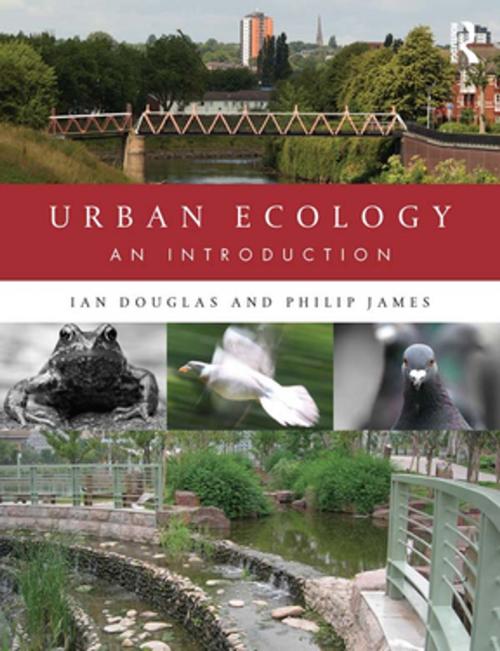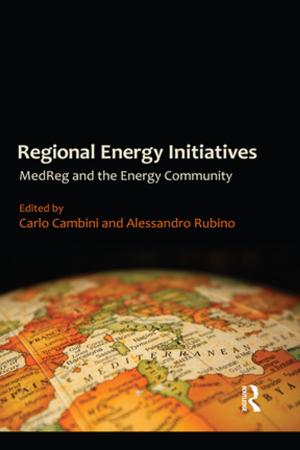Urban Ecology
An Introduction
Nonfiction, Art & Architecture, Architecture, Planning, Science & Nature, Nature, Environment, Ecology| Author: | Ian Douglas, Philip James | ISBN: | 9781136266959 |
| Publisher: | Taylor and Francis | Publication: | October 30, 2014 |
| Imprint: | Routledge | Language: | English |
| Author: | Ian Douglas, Philip James |
| ISBN: | 9781136266959 |
| Publisher: | Taylor and Francis |
| Publication: | October 30, 2014 |
| Imprint: | Routledge |
| Language: | English |
Urban Ecology: An Introduction seeks to open the reader’s mind and eyes to the way in which nature permeates everyday urban living, and how it has to be understood, cared for, and managed in order to make our towns and cities healthier places to visit and in which to live and work. The authors examine how nature can improve our physical and mental health, the air we breathe and the waters we use, as well as boosting our enjoyment of parks and gardens. Urban Ecology sets out the science that underlies the changing natural scene and the tools used to ensure that cities become both capable of adapting to climate change and more beautiful and resilient.
The book begins with a discussion of the nature of urban places and the role of nature in towns and cities. Part 1 looks at the context and content of urban ecology, its relationship to other foci of interest within ecology and other environmental sciences, and the character of city landscapes and ecosystems. In Part 2 the authors set out the physical and chemical components of urban ecosystems and ecological processes, including urban weather and climate, urban geomorphology and soils, urban hydrology and urban biogeochemical cycles. In Part 3 urban habitats, urban flora and fauna, and the effects of, deliberate and inadvertent human action on urban biota are examined. Part 4 contains an exploration of the identification and assessment of ecosystem services in urban areas, emphasising economic evaluation, the importance of urban nature for human health and well-being, and restoration ecology and creative conservation. Finally, in Part 5 the tasks for urban ecologists in optimising and sustaining urban ecosystems, providing for nature in cities, adapting to climate change and in developing the urban future in a more sustainable manner are set out.
Within the 16 chapters of the book – in which examples from around the world are drawn upon - the authors explore current practice and future alternatives, set out procedures for ecological assessment and evaluation, suggest student activities and discussion topics, provide recommended reading and an extensive bibliography. The book contains more than 150 tables and over 150 photographs and diagrams.
Urban Ecology: An Introduction seeks to open the reader’s mind and eyes to the way in which nature permeates everyday urban living, and how it has to be understood, cared for, and managed in order to make our towns and cities healthier places to visit and in which to live and work. The authors examine how nature can improve our physical and mental health, the air we breathe and the waters we use, as well as boosting our enjoyment of parks and gardens. Urban Ecology sets out the science that underlies the changing natural scene and the tools used to ensure that cities become both capable of adapting to climate change and more beautiful and resilient.
The book begins with a discussion of the nature of urban places and the role of nature in towns and cities. Part 1 looks at the context and content of urban ecology, its relationship to other foci of interest within ecology and other environmental sciences, and the character of city landscapes and ecosystems. In Part 2 the authors set out the physical and chemical components of urban ecosystems and ecological processes, including urban weather and climate, urban geomorphology and soils, urban hydrology and urban biogeochemical cycles. In Part 3 urban habitats, urban flora and fauna, and the effects of, deliberate and inadvertent human action on urban biota are examined. Part 4 contains an exploration of the identification and assessment of ecosystem services in urban areas, emphasising economic evaluation, the importance of urban nature for human health and well-being, and restoration ecology and creative conservation. Finally, in Part 5 the tasks for urban ecologists in optimising and sustaining urban ecosystems, providing for nature in cities, adapting to climate change and in developing the urban future in a more sustainable manner are set out.
Within the 16 chapters of the book – in which examples from around the world are drawn upon - the authors explore current practice and future alternatives, set out procedures for ecological assessment and evaluation, suggest student activities and discussion topics, provide recommended reading and an extensive bibliography. The book contains more than 150 tables and over 150 photographs and diagrams.















